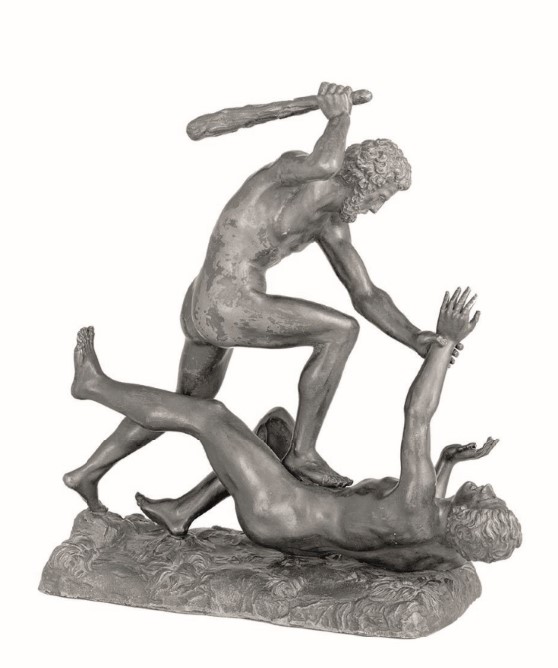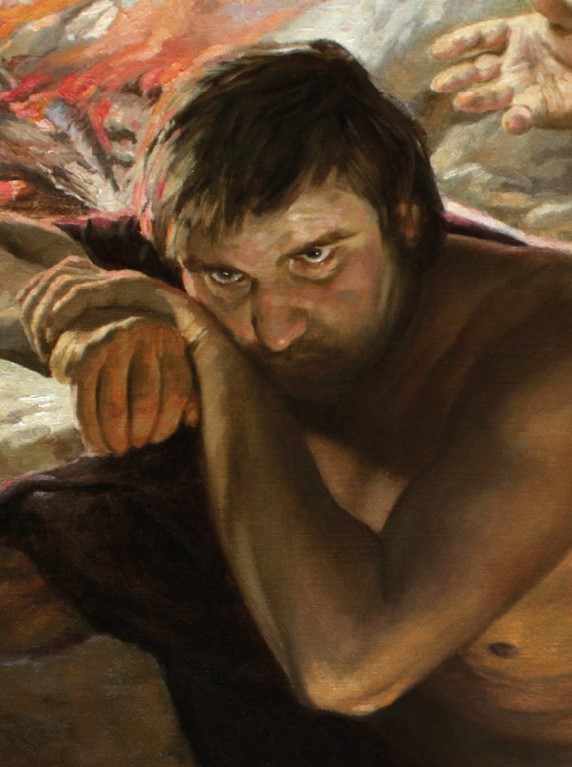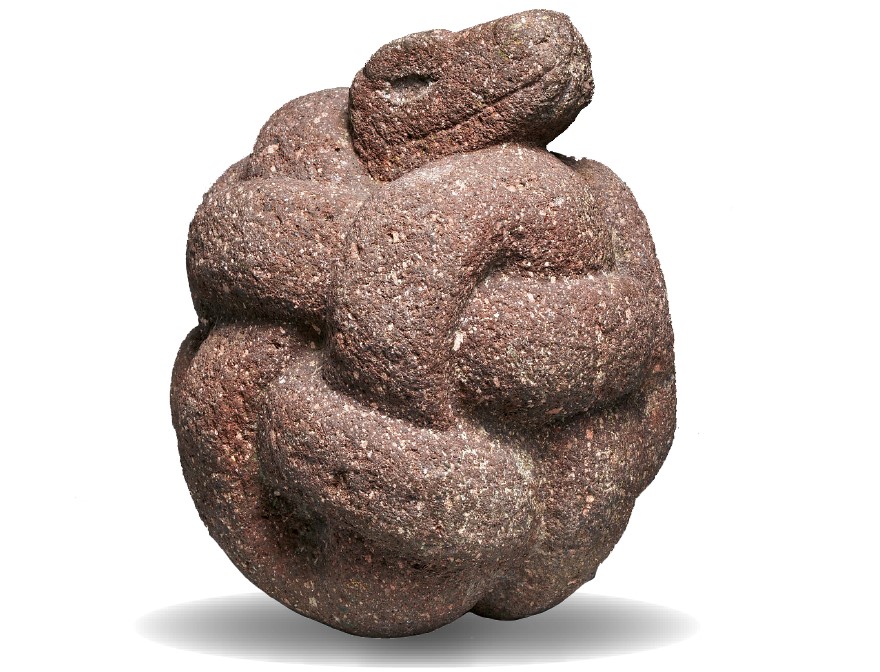Cain was consumed with anger because his vegetable offering had been rejected, and his temper showed in his face. ‘Cain was very angry, and his face fell’ (Genesis 4:5). He had brought to God what he thought He would receive with gratitude, while Abel had brought the lamb that God had asked. Abel’s gift had been received with favour, and Cain’s had been refused. It galled him. He was not really in the right state of mind to stand before the God of all the earth, and God administered a rebuke.
From this conversation and the one that followed, it seems likely that the angel of the Lord stood there at the gate of the Garden of Eden, as the representative of God, to receive the offerings, and to speak on God’s behalf. Similar examples can be found in Genesis 18, and in Exodus 23:20–23.
‘Why are you angry,’ he asked Cain, ‘and why has your face fallen? If you do well, will you not be accepted? And if you do not do well, sin is crouching at the door. Its desire is for you, but you must rule over it’ (Genesis 4:6–7).
Even now, Cain could still put things right, if he ‘did well’ and offered the lamb he should have offered at the first. But with penetrating insight, the Lord knew that the very sin that the offerings were intended to remove, was bubbling up at that moment in Cain’s dark heart. The ugly thoughts that sprang into his consciousness were like the serpent that tempted Eve, a snake crouching at the door ready to strike his heel.
There was still time to trample the temptation under foot, as the ‘seed of the woman’ was going to do in the words of the prophecy made to Cain’s mother Eve (Genesis 3:15). Otherwise Cain would succumb to the deadly poison of sin, and its outworking would bring death that day.
The course of history poised uncertain on the brink, then plunged headlong. Cain considered, and dismissed, the warning voice. His face set hard with hate, and he turned his back on the angel of the Lord.
Two Very Different Men
The contrast between the two brothers at this point is picked out in the New Testament. There is an instructive comment on Abel in the letter to the Hebrews:
By faith Abel offered to God a more acceptable sacrifice than Cain, through which he was commended as righteous, God commending him by accepting his gifts (Hebrews 11:4).
Abel, says the apostle, offered ‘by faith’. He believed in God’s purpose to redeem the sins of humanity through a perfect man, and offered the gift that foreshadowed that
sinless redeemer. Cain offered without faith, and so his sacrifice was unacceptable. It did not make him righteous.
No one has ever been able to purchase the favour of God with a gift. He only counts us righteous when we first have faith. Unfortunately, that is a commitment which many people will not risk. They are prepared to give up pleasures, to support charities, and to do all sorts of good turns, but to have to admit that they are sinners, and have offended God, and meekly to seek His forgiveness in the way He asks, is too much for them.
And that is what was wrong with Cain. Cain lacked faith. He thought he had done enough already. He knew what he ought to do now to make amends, but it meant humiliating himself before Abel and the angel of the Lord. He would have to go to Abel and beg or buy one of his sheep. He would have to light the fire on the altar, and start all over again, admitting he had been wrong. This his pride would not allow him to do. His frustration found outlet in a burst of hatred for Abel, that gentle, oh-so-perfect brother who always did everything right. Abel’s goodness had spotlighted Cain’s own shortcomings, and Cain’s reaction was to blot out and smother the light.
Again, the New Testament comments on the spirit of Cain.
This is the message that you have heard from the beginning, that we should love one another. We should not be like Cain, who was of the evil one and murdered his brother. And why did he murder him? Because his own deeds were evil and his brother’s righteous (1 John 3:11, 12).
The Seed of the Serpent
Cain, says John, was ‘of the evil one’. He was literally the son of Adam and Eve. But in the moment of his hatred, he had become the ‘seed of the serpent’, slave and child of the sin that had mastered him. Jesus too, with bitterness in his voice, denounced the scribes and Pharisees. They were the seed of the serpent like Cain, and they were plotting to kill him for the same reason:
You seek to kill me, a man who has told you the truth that I heard from God… You are of your father the devil, and your will is to do your father’s desires. He was a murderer from the beginning (John 8:40, 44).
Cain’s faults of indifference and pride are easy to indulge. We may not carry envy of our brother or sister to the lengths of violence that Cain did, but we can still murder their character effectively behind their back. We can harden our heart and stubbornly refuse to admit to God and before others that we are at fault. Jude in the New Testament warns us not to go ‘in the way of Cain’ (Jude:11) to our own destruction.
So the first murder was committed. ‘Cain spoke to Abel his brother. And when they were in the field, Cain rose up against his brother Abel and killed him’ (Genesis 4:8).
The Blood of Abel
Afterwards Cain returned to the presence of the Lord as if nothing had happened. ‘Then the Lord said to Cain, “Where is Abel your brother?”’ To complete his catalogue of sins, Cain lied, like the serpent. ‘“I do not know,”’ he said. ‘The Lord said, “What have you done? The voice of your brother’s blood is crying to me from the ground”’
(vs. 9–10). Cain could not conceal his deeds from God. Life is God’s prerogative to give or take away, and Cain had usurped that right. The offence demanded justice.
Again, we can turn to the New Testament for a lesson from this case. The Apostle in Hebrews chapter 12 contrasts the deaths of Abel and the Lord Jesus. Abel and Jesus were both righteous. Both were struck down by wicked hands. Both spilled their blood. But, he insists, the blood of Jesus ‘speaks a better word than the blood of Abel’ (v. 24). The blood of Abel cried out for vengeance for the death of another man. The blood of Jesus was to bring life, life for us all, life even for those who slew him, if they came afterwards to repent.
The Apostle John saw in his last vision a Lamb ‘as though it had been slain’ (Revelation 5:6). He heard a multitude of the redeemed sing a new song to the Lamb: ‘You were slain, and by your blood you ransomed people for God from every tribe and language and people and nation, and you have made them a kingdom and priests to our God, and they shall reign on the earth’ (vs. 9–10).
Every man and woman in that great company will be there through faith in Jesus’ blood, that symbol of life poured out in pain. Those who despise this arrangement of God will remain in the darkness of the grave.
David Pearce
(to be continued)




